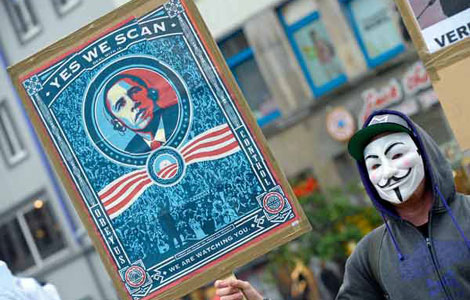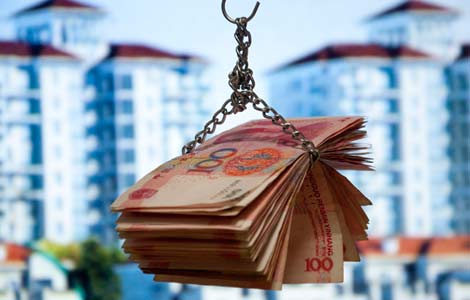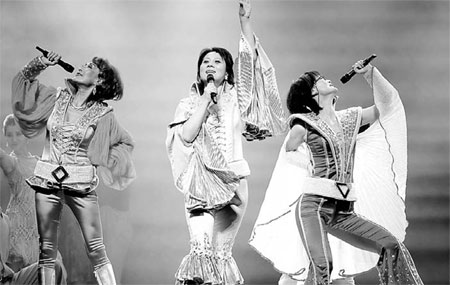Musicals singing all the way to the bank as popularity soars
Updated: 2013-07-01 08:02
By Wu Yiyao in Shanghai (China Daily)
|
||||||||
|
The Chinese version of Mama Mia! by United Asia Live Entertainment. Aside from the musicals coming directly from the West, more are being rendered into Chinese and played by local artists. Provided to China Daily |
Always a blockbuster, The Phantom of the Opera in Shanghai sold 5,000 tickets in May within just five hours to theatre-goers who got up as early as midnight to line up for a seat for the show to be staged in five months.
As part of an Asia-wide tour, the Andrew Lloyd Webber musical will arrive this winter for a long run of more than 60 shows - scarcely enough to feed the city's appetite for musicals.
On average, one ticket is being sold every four seconds - a rate equivalent to train ticket sales during Spring Festival.
An increasing number of musicals have been staged in the city in recent years. Aside from the ones coming directly from London's West End or New York's Broadway with the same casts, settings and languages, more are being rendered into Chinese and played by local artists. They both receive warm approval from Chinese audiences.
"Musicals, among all live entertainment genres, perhaps most easily adapt to the capital market and can be commercialized," said Wang Hongmin, producer of musical Ip Man, a show that focuses on a martial art master's legendary life.
Investment and returns
Blockbuster musicals can produce good returns. Initial investors of Andrew Lloyd Webber's other masterpiece, Cats, reportedly received returns of 3,500 percent, while The Phantom of the Opera has grossed $5.6 billion worldwide, more than any film or television show, according to a report in The Economist.
"For successful shows, it takes no longer than 18 months to recover the cost. Profits keep arriving as long as it is on stage," said Wang.
Unlike films or television series, successful shows can run for years and can tour around the world - an example being Mama Mia!, one of Broadway's best-selling musicals, which has so far garnered a box office return of some 15 billion yuan ($2.44 billion) from audiences around the globe of more than 45 million.
The Chinese version of Mama Mia! by United Asia Live Entertainment (UALE) - the first time a Broadway-quality Western musical was performed in the language of the world's most populous nation, was not lost in translation. Instead, it boasted box office revenues of 130 million yuan by the end of a second round of a national tour in October 2012. It cost about 70 million yuan to produce.
After the success of Mama Mia!, UALE launched Chinese versions of Cats, and a romantic show called Finding Mr. Destiny, which was adapted from a popular South Korean musical. The Chinese version of Cats collected box office revenues of 35 million yuan from 61 shows when it debuted in Shanghai in 2012.
Out of the box
For Ip Man, a musical, which is looking to the international market and will debut in Singapore, a showcase for global musical lovers, the investment can be huge and returns need to be generated from various channels.
"The investment is in the multi-million-dollars. It is perhaps the most expensive musical in terms of cost," said Wang, producer of the show.
The biggest part of the expense goes into production, she said.
"Our music supervisor Martin Koch is a Tony-award winning music supervisor, composer and conductor. He has worked in the music industry in the West End and Broadway for more than half of his life. Also many of our artists have worked in the West End and Broadway," said Wang.
In addition to box office revenues, musical-themed products, such as toys, T-shirts and miniatures of characters, are being designed and developed to generate income, said Wang.
Derivatives of musicals can contribute a significant non-theatrical income in mature markets. About 25 percent of theatre-goers in the West End may purchase derivatives of musicals when they go to see a show. T-shirts, mugs and CD records of the original sound tracks are among the most popular products. Costumes, masks, and stuffed animals are gratefully received by children.
There are detailed studies into market segmentation, said Wang.
"Take T-shirts for example. We have motif-related matching clothes for young couples and children to wear on holiday, polo shirts with embroidered logos for business occasions and specially made shirts for golf players," said Wang.
For musicals adapted from popular shows from other countries, CD records of songs in foreign languages, baseball caps and smartphone cases are among the best-selling products.
"On a single evening we sold more than 20 phone case with cats' ears. Buyers had to line up during the intervals to secure a black cat ear phone case," said Su Shan, a marketing professional for Cats with UALE.
China's audiences are becoming increasingly critical. They expect more than just some popular songs they can sing along to, or settings that look glamorous. Like audiences around the world, they require interaction, emotional involvement and a feeling that "I am in the show", said Li Jing, producer of the Chinese version of Mama Mia! with UALE.
Appeal to audience
Audiences in China across the nation are not shy about singing and dancing along with the artists on stage as the story evolves.
The laughter and the applause when a witty line is heard, the singing and dancing along with the artists, the cheering from the stage and cheering back from the stalls, the curtain calls - everyone can tell how much an audience has been involved, transformed from spectators to players by counting how many times these interactions take place, said Li.
Musicals, as a live entertainment genre, are not new to Chinese audiences. They have developed a taste for the genre, said Du Shan, a composer and a fan of musicals. "You can't just mix some songs into a play and call it a musical, unless it has an outstanding plot, songs and dances," said Du.
For many audiences, the experience of going to a musical is becoming a part of the show.
"I think the most enjoyable thing is that exhausting feeling after you sweat a lot after dancing with the actors on stage because you feel as if you are one of them. It's so different from watching other plays," said Cai Xiaomu, a 28-year-old theatre-goer in Shanghai.
wuyiyao@chinadaily.com.cn
(China Daily USA 07/01/2013 page16)

 Gay pride parade around the world
Gay pride parade around the world
 Four dead in Egypt clashes, scores wounded
Four dead in Egypt clashes, scores wounded
 New NSA spying allegations rile European allies
New NSA spying allegations rile European allies
 Foreign minister makes ASEAN debut as tensions flare
Foreign minister makes ASEAN debut as tensions flare
 Yao stresses transparency in charity
Yao stresses transparency in charity
 NYC's gay pride march for celebration
NYC's gay pride march for celebration
 Massive debt plagues local gov't
Massive debt plagues local gov't
 Looking abroad for better investment
Looking abroad for better investment
Most Viewed
Editor's Picks

|

|

|

|

|

|
Today's Top News
Chinese, US deals will grow this year
US updates duties on Chinese honey
Looking abroad for better investment
Mixed outlook for EV makers in China and US
Obama to announce new power initiative for Africa
China's June manufacturing PMI falls to 50.1
Longer term for visas to attract talent
Putin signs anti-gay measures into law
US Weekly

|

|







